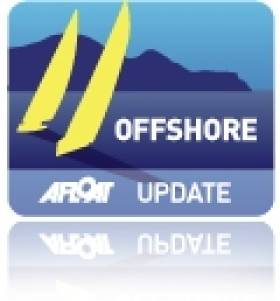Displaying items by tag: pffshore
Damian Foxall's Transat Jacques Vabre Start Postponed
#offshore – Violent low-pressure systems sweeping in from the West forced the Transat Jacques Vabre race committee to postpone the start of the 11th edition for the second time and to cancel the MOD70 20nm prologue for the Sultanate of Oman's flagship campaign Oman Air-Musandam and their competitor, Edmond de Rothschild.
Originally planned for Sunday, weather conditions delayed the scheduled start to Monday for the IMOCA 60s, Class 40s and Multi 50s, with a prologue planned for the two MOD70s, but late Sunday night the race committee decided to further postpone until Thursday at the earliest for all except the MOD70s that might be able to slip out on Wednesday.
"Starting this race in November is always challenging, we had a low pressure come through last night and there is another one coming through tomorrow and the most important thing for the race committee is to get us off safely," said Damian Foxall from Ireland who has over 350,000 nautical miles behind him, a recent Volvo Ocean Race win with Groupama and is on his third Transat Jacques Vabre.
Oman Air-Musandam skipper, Sidney Gavignet (FRA), who has his fair share of single-handed, double-handed and Volvo Ocean Races under his belt explained the challenges that the race committee faces: "The fleet is made up of very fast boats with the MOD70s; intermediate boats with the Multi 50s and the IMOCA 60s and then the Class 40s which are a bit slower and mixed amateur and professional crews. For this reason it is very difficult to find a window.
"It is easier for us because we go quickly so we need a small window of opportunity to get out of the English Channel and to Finisterre from where we can consider we are in good shape, still very safety conscious, of course, but looking for speed as well. For the Class 40s it takes some time to get out of the Channel and through Biscay, so it is more complicated," he said.
"The MOD70s are very seaworthy boats, they are one design, well built and really reliable. We have been sailing them hard all year in very rough conditions, but of course with the current conditions of very high westerlies blowing against the tide, the sea state is very steep and rough. They are boat-breaking conditions out there right now," added Damian.
For the race organisation sending a fleet of 43 boats out – that is 86 people on the water – is a major decision and a big responsibility. "It is hard. I think they made the right decision to delay, these conditions are boat breaking – in Biscay there is a 4 to 5 metre sea state whipped up by the westerlies that have been blowing for the last three days, but now the challenge is to find the right window to start," said Sidney.
In the meantime, the Oman Air-Musandam duo will continue with their routine of gym, weather checks and boat checks until the race committee calls for a start.
"We are ready to go and looking forward to the warmer weather in the South!" said Sidney as the skies opened once more over Le Havre.
TV Interviews with Damian Foxall (IRL) and Sidney Gavignet (FRA) in French and English on the weather and the postponement will be available from 1800CET





























































